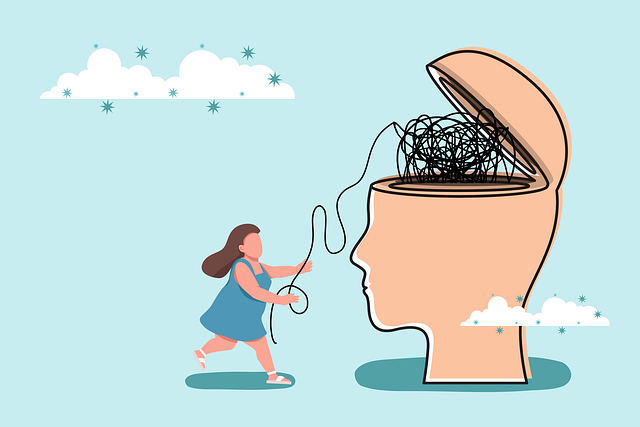Emotional intelligence (EI) is a powerful tool in Christian counseling, enhancing connections between therapists and clients by managing emotions and building trust. Integrating EI into therapy for Christian Counseling offers culturally competent care, improves self-esteem, and helps navigate complex emotional challenges. Key practices include self-awareness, active listening, compassion, and mindfulness, which facilitate personal growth, relationship building, and effective risk management in high-stress professions like counseling.
Emotional intelligence (EI) is a powerful tool for therapists, especially in the context of Christian counseling. This article explores how understanding and developing EI can enhance therapeutic practices. We delve into key components such as self-awareness, active listening, emotion management, and compassion, offering practical strategies for Christian counselors to foster deeper connections with clients. By embracing these principles, therapy becomes a more effective and transformative experience, benefiting both the counselor and those seeking guidance.
- Understanding Emotional Intelligence: Unlocking Its Power in Christian Counseling
- The Role of Self-Awareness in Building Empathy and Connection
- Developing Active Listening Skills for Deeper Interactions
- Managing Emotions Constructively: Strategies for Christian Counselors
- Practicing Compassion and Kindness: A Cornerstone of Emotional Intelligence
Understanding Emotional Intelligence: Unlocking Its Power in Christian Counseling

Emotional intelligence (EI) is a powerful tool in Christian counseling, enabling therapists to connect deeply with clients and offer compassionate support. Understanding EI involves recognizing and managing one’s own emotions, as well as comprehending and responding appropriately to the feelings of others. This skill set is particularly pertinent in therapy, where fostering trust and understanding is paramount. By integrating EI into their practice, healthcare providers in Christian counseling can create a safe space for clients to explore sensitive issues, improve self-esteem, and navigate complex emotional challenges.
The concept of EI transcends cultural boundaries, making it an essential component of cultural competency training for mental health professionals. This training equips therapists with the ability to adapt their approach, ensuring effective communication and empathy across diverse client backgrounds. Moreover, cultivating strong emotional intelligence enhances risk management planning by helping professionals anticipate and navigate potential triggers or emotional crises during counseling sessions. Through these means, Christian counselors can provide more personalized, impactful therapy tailored to each client’s unique needs and cultural context.
The Role of Self-Awareness in Building Empathy and Connection

In the realm of Christian counseling therapy, fostering emotional intelligence is a cornerstone of personal growth and relationship building. Self-awareness plays a pivotal role in this journey, serving as the foundation for cultivating empathy and meaningful connections. By developing an acute understanding of one’s emotions, thoughts, and behaviors, individuals can begin to navigate their interactions with others more effectively. This introspective practice enables people to recognize not only their own feelings but also to empathize with the emotional landscapes of those around them.
Through self-awareness, individuals gain valuable insights into their triggers, strengths, and vulnerabilities. Such introspection facilitates a deeper understanding of how personal experiences shape one’s responses in various situations. For instance, recognizing patterns of reaction during times of stress can be a powerful tool for depression prevention. By acknowledging these patterns, individuals can implement empathy-building strategies to foster healthier interactions and strengthen relationships, ultimately enhancing their overall emotional intelligence.
Developing Active Listening Skills for Deeper Interactions

In the journey towards fostering emotional intelligence, especially within the context of Christian counseling, active listening stands as a cornerstone. It involves more than just hearing; it’s about deeply understanding and empathizing with what others are expressing, be it their joys, fears, or struggles. This skill is not only valuable in therapy sessions but also has profound implications for meaningful interactions across various settings, including personal relationships and professional environments like healthcare.
For Christian counselors, integrating active listening into practice can lead to more impactful counseling sessions. It encourages clients to open up, fostering a safe space where emotions can be explored without judgment. This approach aligns with burnout prevention strategies for healthcare providers, as it promotes emotional regulation and mental wellness, which are crucial for maintaining balance in high-stress professions.
Managing Emotions Constructively: Strategies for Christian Counselors

Emotional intelligence is a vital tool for Christian counselors, enabling them to effectively manage their own emotions and those of their clients. In therapy sessions, counselors often encounter individuals grappling with various emotional challenges—from anxiety and depression to relationship issues. Therefore, cultivating constructive emotion management skills is essential. This involves recognizing and understanding one’s own emotions and learning healthy ways to express them.
Christian counselors can employ strategies such as mindfulness practices to stay present and grounded during intense emotional moments. They can also encourage clients to explore their feelings through non-judgmental listening and open dialogue, fostering a safe space for self-reflection and growth. Additionally, focusing on stress management techniques and promoting self-esteem improvement can significantly enhance both the counselor’s well-being and their ability to support others. This holistic approach, combined with regular risk assessment for mental health professionals, ensures that counselors remain equipped to navigate complex emotional landscapes effectively within the context of Christian counseling therapy.
Practicing Compassion and Kindness: A Cornerstone of Emotional Intelligence

Practicing compassion and kindness is a cornerstone of emotional intelligence, fostering deeper connections and enhancing overall well-being. This involves actively listening to others, empathy — putting yourself in someone else’s shoes — and responding with genuineness and support. In the context of Christian counseling, therapy can provide a safe space for individuals to explore and cultivate these qualities, even during crises. Therapists skilled in crisis intervention guidance teach clients effective coping mechanisms and help them navigate challenging emotions, promoting mental illness stigma reduction efforts.
By integrating compassion and kindness into their daily lives, individuals can improve mood management and build stronger relationships. These practices are not only beneficial for personal growth but also have a positive ripple effect on communities, creating a more supportive and empathetic environment. In therapy sessions, clients learn to extend kindness not just to others but also to themselves, leading to increased self-awareness and resilience — crucial aspects of emotional intelligence.
Emotional intelligence is a powerful tool in the field of Christian counseling, fostering deeper connections and more effective therapy. By understanding and managing their own emotions, counselors can enhance self-awareness, improve active listening skills, and provide more compassionate support to their clients. Implementing these strategies not only benefits individual clients but also enriches the overall therapeutic environment, making it a vital aspect of modern Christian counseling practices.









